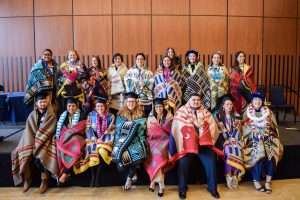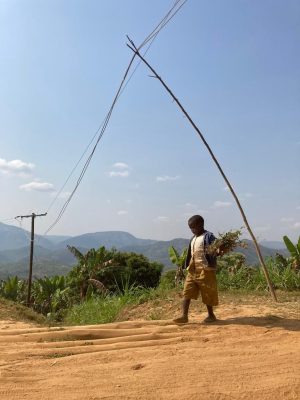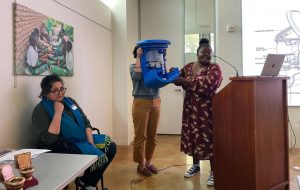Twenty-partner alliance to expand programing around food, energy, and water systems

BERKELEY, CA – August 5, 2021 – The UC Berkeley Blum Center for Developing Economies announced today that a wide range of academic programing around food, energy, and water systems (FEWS) designed by and for Native Americans and other underrepresented student groups will expand substantially as a result of a new $10 million National Science Foundation (NSF) grant to the University of California, Berkeley and the University of Arizona, in collaboration with the American Indian Higher Education Consortium and more than 20 additional partners.
The NSF grant springs from past work based at the Blum Center featuring successful collaborations with Native American FEWS experts and tribal colleges, nations, and communities throughout the West. The five-year grant will expand the vision and the impact. The overarching goal is to significantly broaden the opportunities for participation and the ecosystem of research and training by and for Native Americans and other underrepresented student groups.
Native American households are 4 times more likely to report not having enough to eat compared to other U.S. households; 14 percent lack access to electricity; and 9 percent do not have access to safe, adequate water supplies and also lack access to waste disposal facilities. Historical factors that led to these conditions are exacerbated by accelerating climate change, more frequent natural disasters, and the current pandemic – all of which has had a disproportionate impact on Indigenous peoples.
At the same time, there is scarce representation of Indigenous professionals in engineering positions with both the technical know-how and the socio-cultural understanding to implement solutions on Indigenous lands. This project will focus on these two interconnected challenges: the crisis in access to food, energy, and water in Indigenous communities and the paucity of educational and career pathways available to Indigenous peoples to address these crises.
“To empower Native American communities, it’s important to consider the FEWS nexus on tribal lands from a systems perspective that is both Indigenous and place-based,” says Principal Investigator Alice Agogino, Blum Center Education Director and Professor of Mechanical Engineering at UC Berkeley. “Many holistic concepts of food, energy, and water systems are already deeply connected to traditional practices of Native Americans across the country, yet STEM educational pathways in the U.S. are often more narrowly defined.”
University of Arizona Associate Professor of Environmental Science Karletta Chief, a member of the Diné nation, is the P.I. on the collaborative proposal from UArizona. Along with Agogino, the two project leads (who have worked together for two years on projects around environmental knowledge and educational practices in Native American communities) will partner with a number of other institutions and alliances representing native groups, including Diné, Laguna, Mohawk, Lumbee, Pomo, Samish, Hidatsa, Mandan, Dakota, Nakota, and Cherokee, among others.
The American Indian Higher Education Consortium (AIHEC) will be the backbone for the project. AIHEC represents 37 tribal colleges and universities (TCUs) across the U.S., providing leadership and advocating for policy and programs that expand higher education opportunities to American Indians.
On the Berkeley campus – the unceded Ohlone land of Xučyun – the project is supported by the Office of Graduate Diversity and the American Indian Graduate Program (AIGP), headed up by Patrick Naranjo, a tribal member from Santa Clara Pueblo.
This initiative is the latest of the NSF INCLUDES series grants, a program launched in 2018 to develop a national network to enhance U.S. leadership in science, technology, engineering, and mathematics (STEM) by broadening participation in those disciplines.
“NSF INCLUDES addresses populations largely missing in the current science and engineering enterprise,” said NSF Director France Córdova, announcing the program. “Their inclusion is essential in helping the U.S. maintain its position as the world’s leader in innovation.”
The Blum Center for Developing Economies at UC Berkeley, founded in 2006 to address urgent global challenges globally and locally, will serve as the NSF INCLUDES project home and administrative hub. For more information, see blumcenter.berkeley.edu.




